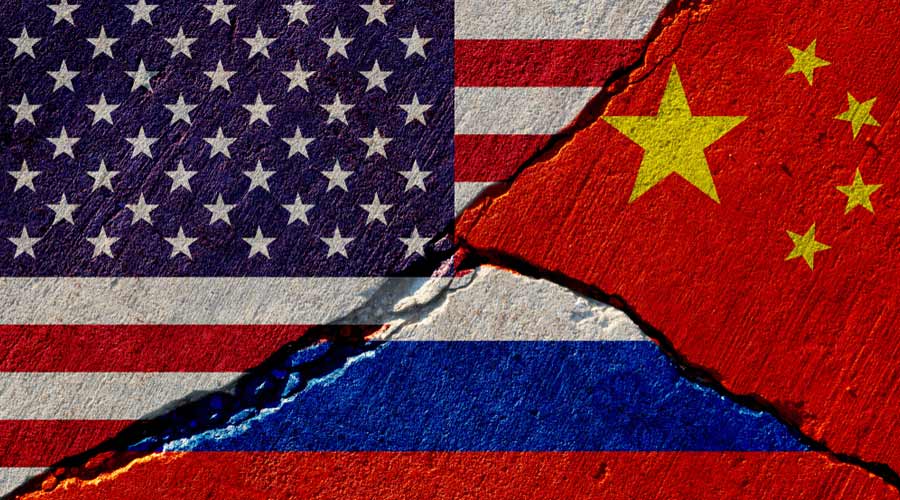From the everchanging canvas of global affairs, picking up only a few developments every week is not easy. There are events, incidents, talks, exercises and much more! But the developments that impact global politics by and large indeed need to get featured. This week also remained happening considering such affairs. While Russia and Ukraine are engrossed in a war that has changed world politics significantly (and everyone is tired of discussing the same!), another news that’s going to impact world politics came from Pakistan. Amid serious economic and political crisis, Pakistan
dissolved its parliament prematurely. There are multiple reasons behind this announcement, but one thing remains unchanged, Pakistan is run by its military. Despite announcing itself as a democratic country, Pakistan never believed in democratic values, and now is facing the repercussions. Although whenever there is a discussion related to the countries that do not believe
in democratic values, China tops the list. With its aggressive ambitions and behaviour, it keeps positing security threats to global peace and security. Beside this, China too is facing multiple economic issues at its home turf. This week, the US President has stated that China is a ticking time bomb, which has invited sharp reactions from China. Pakistan’s political chaos For many months, a political drama is going on in Pakistan. The world knows that it is a failed state.
Now it has dissolved its parliament on the recommendation of its PM, Shehbaz Sharif, setting up the stage for next general elections. As per the constitutional rule, a caretaker government will oversee elections now. Why the Pakistani PM recommended for dissolving the parliament just three days before it could complete its term? When Imran Khan is already in jail and has been banned from contesting the elections, what benefit will Sharif’s party get? How a country that cannot provide
every day’s staple to its people will manage to conduct the elections in next three months? These are some important questions that need to be answered. Pakistan’s economy is facing a big crisis
despite the bailout from IMF’s help. Inflation, unemployment and foreign debts are on all time high in Pakistan. Imran Khan and his party have already forced in to silence. Then why Sharif took this decision? Well, let’s understand how and when Sharif became the PM of Pakistan. The opposition got the support of 174 members in its 342-member National Assembly after the resignation of Imran Khan from the post of PM in April last year. Along with Pakistan Muslim League-N (PML-N) party leader Shehbaz Sharif, there were many other parties as well, who opened a front to oust Imran from power. This joint alliance included PML-N along with Pakistan People's Party (PPP), Muttahida Qaumi
Movement Pakistan (MQM-Pakistan), Jamiat Ulema-e-Islam (JUI-F), PML-Q and several smaller parties. Leader of this united opposition, Shahbaz Sharif, was made the new PM of Pakistan. (Don’t forget who had the strings of this puppet government though!) Reasons for dissolution of Pakistan’s government Under Article 52 of the constitution of Pakistan, its National Assembly has to be dissolved after the government completes five years. This can be considered as the beginning of the election process in simple language. At the same time, according to Article 58, if the President does not dissolve the assembly within 48 hours on the recommendation of the PM, then it is automatically considered dissolved. After dissolution, the National Assembly Secretariat issues a notification. After this, the
power is transferred to a caretaker government, which manages the country till new PM takes over.
The current term of Shahbaz Sharif’s government was to end on 12 August this year. But just three days before this, on August 9, National Assembly was dissolved. The biggest reason behind this is the time lag that Sharif would be getting now. Under the constitution of Pakistan, if the National Assembly completes its term, it is mandatory to hold elections within 60 days. But if the National Assembly is dissolved prematurely, the government gets time period of 90 days. Also, IMF would be
sending another round of economic aid to Pakistan in next 90 days. This means Sharif will get time to
create favourable conditions for his party’s win. Will this all help him and his party? Only time can tell. But one this is sure. This political disturbance would further worsen the existing conditions in Pakistan. The caretaker government will not have the power to attend any international meeting or sign any international document as per the constitution of Pakistan. This will impact the global affairs for sure. Tensions deepen b/w USA and China This week, another statement from the US President left China is fury. After calling Xi a dictator, now Joe Biden has called China a ticking time bomb because of its worsening economic situation. This week, Biden also signed an executive order to prohibit new investments from the US in China in sensitive technologies like computer chips. China is already facing severe economic issues and it needs to pay attention on increasing inflation, unemployment and its demand and supply
mechanism. But what Biden is doing shows that it is an ugly fight between world’s largest and the second largest economies. Political, social or economic, the games that are played on the international turf impact a common man at the end of the day. The leaders need to remember that their influence is not everlasting and hence they need to play for the betterment of humanity, not for power.
The author is Professor, School of International Studies, JNU







